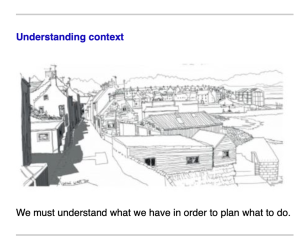 Designing Buildings Wiki (DBW) – host platform for the IHBC’s Conservation Wiki and the ‘construction industry knowledge base’ – has featured on its Newsletter Laura Alvarez (Senior Principal Urban Design and Conservation Officer at Nottingham City Council) on ‘Understanding Context’, as posted in the recent Urban Design issue of the IHBC’s membership journal Context.
Designing Buildings Wiki (DBW) – host platform for the IHBC’s Conservation Wiki and the ‘construction industry knowledge base’ – has featured on its Newsletter Laura Alvarez (Senior Principal Urban Design and Conservation Officer at Nottingham City Council) on ‘Understanding Context’, as posted in the recent Urban Design issue of the IHBC’s membership journal Context.
… imagine an ecosystem whose components are connected by the processes that associate them…
Laura writes:
Britain’s built environment has seen better days. The quality of design has decayed. Sustainable development has been difficult to achieve. Local authorities have suffered a huge loss of skills and resources, but the pro-active planning lobby requires both. Placemaking, considered the best vehicle to achieve sustainability, is not always evidenced in planning applications; rather, a vast number of submissions lack contextual analysis, adequate depth of information and design integrity. Built-environment education seems polarised towards two distinctive strands: first, a tight understanding and adherence to rules; and, second, idealistic utopias difficult to deliver. Design schools are progressively diverting from contextual cognitive learning to producing striking imagery with futuristic tools, a promising glossy world of practice that attracts paying students but results in a loss of skills.
The problems in the industry are systemic, poor outcomes being largely due to how all the parties involved interact. An effective way to move forward would involve a holistic understanding of the context in which built environment professions operate. That context involves big issues like climate change, health and wellbeing, housing, welfare, equality and inclusivity, all of which transcend both geographical and scholarly boundaries, and which require system-thinking and collaborative, pragmatic approaches. Positive change requires a change of model.
Imagine an engine whose pieces can be removed and repaired individually. Current legislation operates like that, considering all specialities separately. Now imagine an ecosystem whose components are connected by the processes that associate them, rather than by their individual qualities. An organic, systemic approach that focuses on the relationship between the parts, their relative hierarchy and the way in which they affect each other would seem far more plausible as a model for the future of planning.
Conversely, the parts of the industry are heading in different directions, failing to reconciliate their goals and motivations, or to deliver a common agenda. Professional bodies are insular, having self-regulated codes of practice that emerged from old models like the engine that we imagined, which are no longer appropriate. In response to such an archaic ethos, higher education bodies offer technological advances and complex software solutions that promise a future of construction allegedly capable of eliminating errors by automatising design processes. The danger is that improved tools applied to the old model will continue to exacerbate problems, but do it faster than before…
Specialist skill-sets of urban designers:
Working
- Within political frameworks
- Negotiating to add value
- Based on evidence
- Bridging theory and practice
- Joining disciplines and communities
Understanding
- Society and human behaviour
- Policy and ownership
- Design and form
- Economy and value
- Natural environments
Thinking about
- Human needs first
- Systems and processes
- Spaces between buildings
- Long-term changes
- Context and culture
The built environment requires a cultural change that goes beyond the use of emerging technology and the application of complex tools. It is time to question the role of each specialism and how they relate….
See Laura’s article in full HERE
See the full Urban Design issue online HERE
See more background on the issue HERE
Access the online archive
Reading Context helps IHBC members develop their skills across all of the IHBC’s Areas of Competence, and so is a critical baseline in addressing priorities in Continuing Professional Development (CPD)
See more IHBC background and guidance on IHBC CPD and on how you might use past, current and future issues of Context

